The post Why CC Signals: An Update appeared first on Creative Commons.
]]>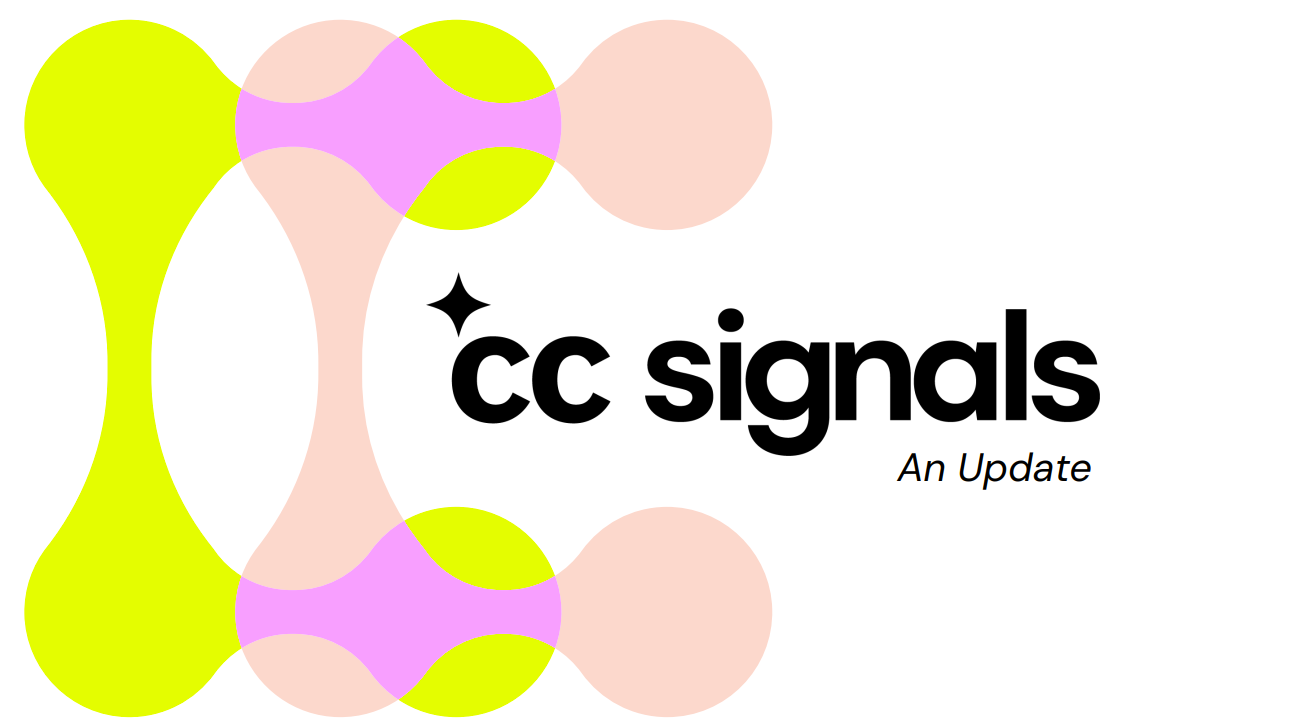
Thanks to everyone who attended our CC signals project kickoff last week. We’re receiving plenty of feedback, and we appreciate the insights. We are listening to all of it and hope that you continue to engage with us as we seek to make this framework fit for purpose.
Some of the input focuses on the specifics of the CC signals proposal, offering constructive questions and suggesting ideas for improving CC signals in practice. The most salient type of feedback, however, is touching on something far deeper than the CC signals themselves – the fact that so much about AI seems to be happening to us all, rather than with or for us all, and that the expectations of creators and communities are at risk of being overshadowed by powerful interests.
This sentiment is not a surprise to us. We feel it, too. In fact, it is why we are doing this project. CC’s goal has always been to grow and sustain the thriving commons of knowledge and culture. We want people to be able to share with and learn from each other, without being or feeling exploited. CC signals is an extension of that mission in this evolving AI landscape.
We believe that the current practices of AI companies pose a threat to the future of the commons. Many creators and knowledge communities are feeling betrayed by how AI is being developed and deployed. The result is that people are understandably turning to enclosure. Eventually, we fear that people will no longer want to share publicly at all.
CC signals are a first step to reduce this damage by giving more agency to those who create and hold content. Unlike the CC licenses, they are explicitly designed to signal expectations even where copyright law is silent or unclear, when it does not apply, and where it varies by jurisdiction. We have listened to creators who want to share their work but also have concerns about exploitation. CC signals provide a way for creators to express those nuances. The CC signals build on top of developing standards for expressing AI usage preferences (e.g., via robots.txt). Creators who want to fully opt out of machine reuse do not need to use a CC signal. CC signals are for those who want to keep sharing, but with some terms attached.
The challenge we’re all facing in this age of AI is how to protect the integrity and vitality of the commons. The listening we’ve been doing so far, across creator communities and open knowledge networks, has led us here, to CC signals. Our shared commitment is to protect the commons so that it remains a space for human creativity, collaboration, and innovation, and to make clear our expectation that those who draw from it give something in return.
Our goal is to advocate for reciprocity while upholding our values that knowledge and creativity should not be treated as commodities.
Our goal is to find a path between a free-for-all and an internet of paywalls.
Copyright will not get us there. Nor should it. And we don’t think the boundaries of copyright tell us everything we need to know about navigating this moment. Just this week, Open Future released a report that calls for going beyond copyright in this debate, on the path to a healthy knowledge commons.
This is the beginning of the conversation, not the end. We are listening. From what we have heard, CC signals, or something like it, is the best practical mechanism to avoid the dual traps of total exploitation or total enclosure, both of which damage the commons. We have shared our current progress because we want to learn how to design it to meet your needs. We invite you to continue sharing feedback so we can shape CC signals together in a way that works for diverse communities.
In the months ahead, we’ll be providing more detail about how CC signals are developing, including key themes we are hearing, along with the questions we are exploring and our next steps.
The post Why CC Signals: An Update appeared first on Creative Commons.
]]>The post Introducing CC Signals: A New Social Contract for the Age of AI appeared first on Creative Commons.
]]>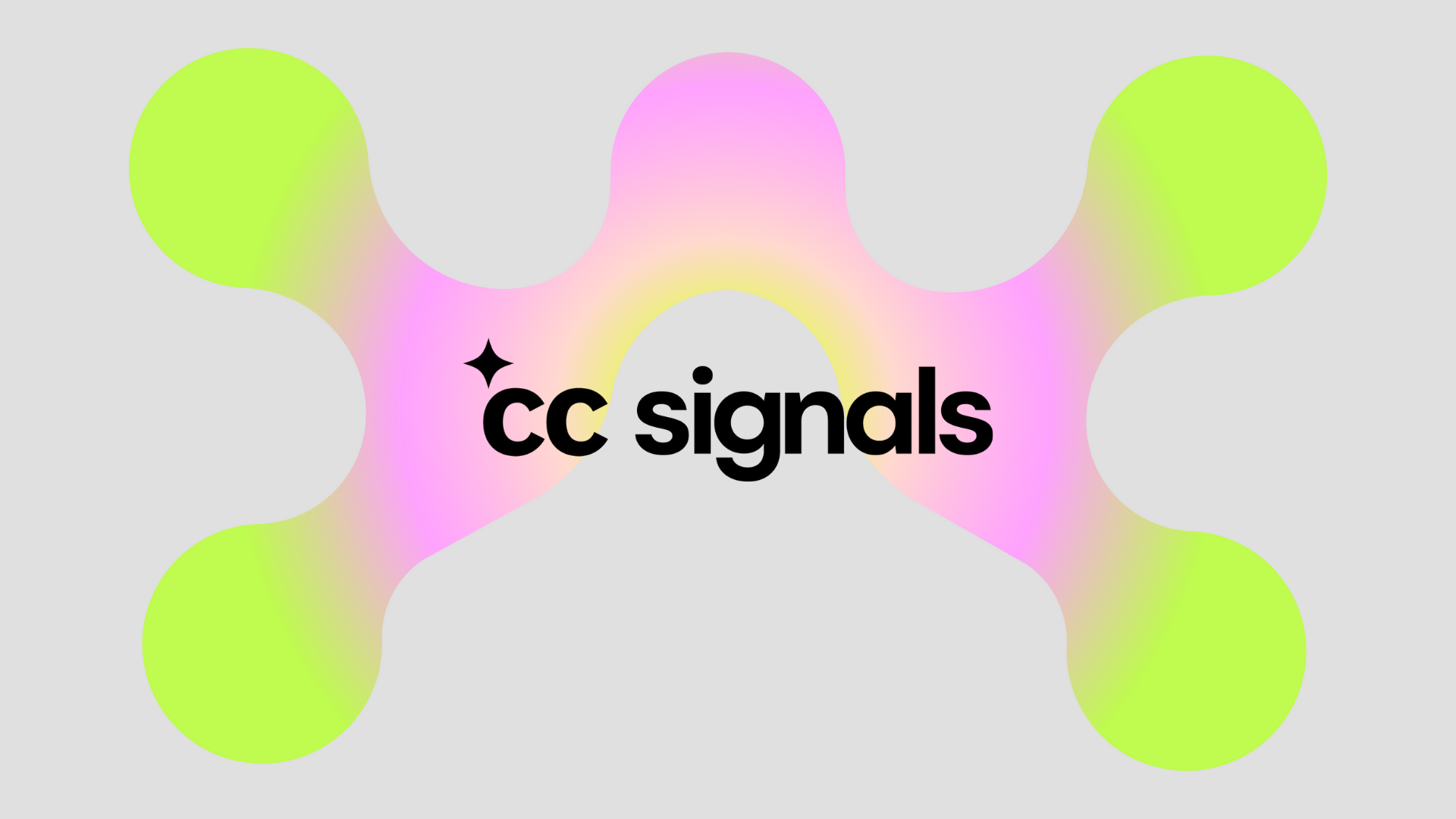
Creative Commons (CC) today announces the public kickoff of the CC signals project, a new preference signals framework designed to increase reciprocity and sustain a creative commons in the age of AI. The development of CC signals represents a major step forward in building a more equitable, sustainable AI ecosystem rooted in shared benefits. This step is the culmination of years of consultation and analysis. As we enter this new phase of work, we are actively seeking input from the public.
As artificial intelligence (AI) transforms how knowledge is created, shared, and reused, we are at a fork in the road that will define the future of access to knowledge and shared creativity. One path leads to data extraction and the erosion of openness; the other leads to a walled-off internet guarded by paywalls. CC signals offer another way, grounded in the nuanced values of the commons expressed by the collective.
Based on the same principles that gave rise to the CC licenses and tens of billions of works openly licensed online, CC signals will allow dataset holders to signal their preferences for how their content can be reused by machines based on a set of limited but meaningful options shaped in the public interest. They are both a technical and legal tool and a social proposition: a call for a new pact between those who share data and those who use it to train AI models.
“CC signals are designed to sustain the commons in the age of AI,” said Anna Tumadóttir, CEO, Creative Commons. “Just as the CC licenses helped build the open web, we believe CC signals will help shape an open AI ecosystem grounded in reciprocity.”
CC signals recognize that change requires systems-level coordination. They are tools that will be built for machine and human readability, and are flexible across legal, technical, and normative contexts. However, at their core CC signals are anchored in mobilizing the power of the collective. While CC signals may range in enforceability, legally binding in some cases and normative in others, their application will always carry ethical weight that says we give, we take, we give again, and we are all in this together.
“If we are committed to a future where knowledge remains open, we need to collectively insist on a new kind of give-and-take,” said Sarah Hinchliff Pearson, General Counsel, Creative Commons. “A single preference, uniquely expressed, is inconsequential in the machine age. But together, we can demand a different way.”
Now Ready for Feedback
More information about CC signals and early design decisions are available on the CC website. We are committed to developing CC signals transparently and alongside our partners and community. We are actively seeking public feedback and input over the next few months as we work toward an alpha launch in November 2025.
Get Involved
Join the discussion & share your feedback
To give feedback on the current CC signals proposal, hop over to the CC signals GitHub repository. You can engage in a few ways:
- Read about the technical implementation of CC signals
- Join the discussion to share feedback about the CC signals project
- Submit an issue for any suggested direct edits
Attend a CC signals town hall
We invite our community to join us for a brief explanation of the CC signals framework, and then we will open the floor to you to share feedback and ask questions.
Tuesday, July 15
6–7 PM UTC
Register here.
Tuesday, July 29
1–2 PM UTC
Register here.
Friday, Aug 15
3–4 PM UTC
Register here.
Support the movement
CC is a nonprofit. Help us build CC signals with a donation.
The age of AI demands new tools, new norms, and new forms of cooperation. With CC signals, we’re building a future where shared knowledge continues to thrive. Join us.
The post Introducing CC Signals: A New Social Contract for the Age of AI appeared first on Creative Commons.
]]>The post Understanding CC Licenses and AI Training: A Legal Primer appeared first on Creative Commons.
]]>The application of copyright law to AI training is complex. The CC licenses are copyright licenses, so it follows that applying CC licenses to AI training is just as complex.
The short answer is: AI training is often permitted by copyright. This means that the CC license conditions have limited application to machine reuse. This also means that using a more restrictive CC license in an effort to prevent AI training is not an effective approach. In fact, restrictive licensing may actually end up preventing the kind of sharing you want (like allowing for translation, for example), while not being effective to block AI training.
For the long answer, read our new guide that provides a legal analysis and overview of the considerations when using CC-licensed works for AI training.
 For an at-a-glance overview, head over to the Using CC-Licensed Works for AI training webpage.
For an at-a-glance overview, head over to the Using CC-Licensed Works for AI training webpage.
 For a more in-depth analysis, check out our handy PDF download.
For a more in-depth analysis, check out our handy PDF download.
 For those who love a visual, take a look at our supplementary flowchart.
For those who love a visual, take a look at our supplementary flowchart.
If the CC licenses have limited application to machine reuse, what agency do creators have in the AI ecosystem?
This is an important question. As you’ve heard us talk about before, we’re actively developing a CC preference signals framework to help bridge this gap. The framework is designed to offer new choices for stewards of large collections of content to signal their preferences when sharing their works, using scaffolding inspired by the architecture of the CC licenses. This is not mediated through copyright or the CC licenses. It is governed by something that tends to be even more widely adopted: a social contract. Stand by for the release of the paper prototype of CC preference signals framework at the end of June 2025.
While you are here, please consider making an annual recurring donation via our Open Infrastructure Circle. This work will require a large amount of resourcing, over many years, to make happen.
The post Understanding CC Licenses and AI Training: A Legal Primer appeared first on Creative Commons.
]]>The post CC @ SXSW: Protecting the Commons in the Age of AI appeared first on Creative Commons.
]]>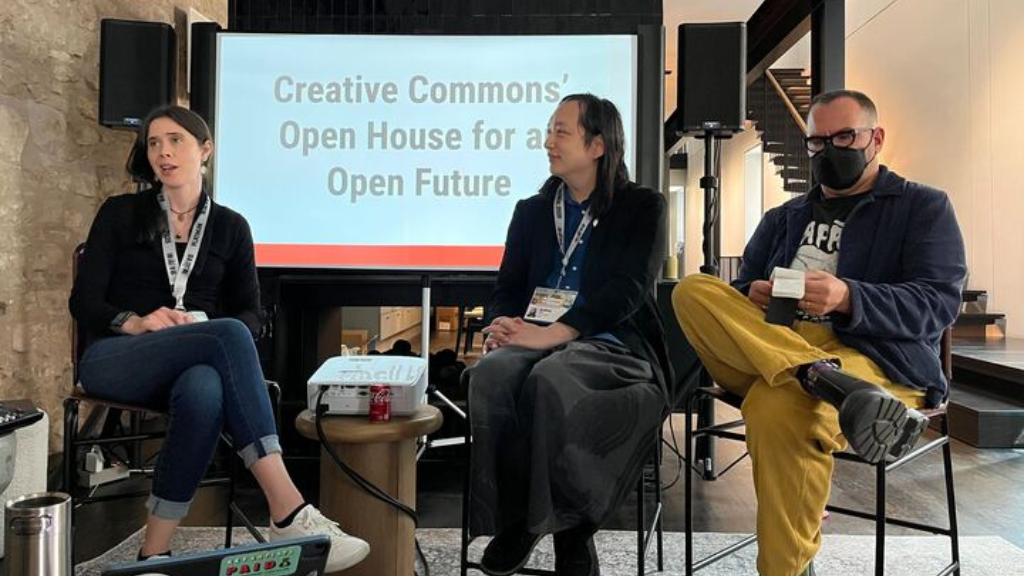
If you’ve been following along on the blog this year, you’ll know that we’ve been thinking a lot about the future of open, particularly in this age of AI. With our 2025-2028 strategy to guide us, we’ve been louder about a renewed call for reciprocity to defend and protect the commons as well as the importance of openness in AI and open licensing to avoid an enclosure of the commons.
Last month, we took some of these conversations on the road and hosted the Open House for an Open Future during SXSW in Austin, TX, as part of a weekend-long Wiki Haus event with our friends at the Wikimedia Foundation.
During the event, we spoke with Audrey Tang and Cory Doctorow about the future of open, especially as we look towards CC’s 25th anniversary in 2026. In this wide-ranging conversation, a number of themes were reflected that capture both where we’ve been over the last 25 years and where we should be focusing for the next 25 years, including:
- The Fight for Technological Self-Determination: Contractual restrictions are increasingly being used to lock down essential technologies, from printer ink to hospital ventilators. The push for openness and economic fairness must go beyond just content-sharing and extend to fighting for the rights of people to repair, modify, and use technology freely.
- Shifting from Resistance to Building Alternatives: The open movement is not just about opposing corporate restrictions but also about creating viable, open alternatives. Initiatives like Gov Zero show that fostering decentralized, user-controlled platforms can help counteract monopolistic digital ecosystems.
- The Power of Exit as a Lever for Change: Simply having the option to leave restrictive platforms can influence corporate behavior. Efforts like Free Our Feeds and Bluesky aim to create credible exit strategies that prevent users from being locked into exploitative digital environments.
- Beyond Copyright: New Frameworks for Openness and Innovation: While Creative Commons began as a response to copyright limitations, the next phase should focus on broader issues like supporting an infrastructure for open sharing, ethical AI development, and open governance models that empower communities rather than just limiting corporate control.
- Reclaiming the Ethos of Open Source and Free Software: The movement must reconnect with its ethical roots, focusing on freedom to create, share, and innovate—not just openness for the sake of efficiency. This includes resisting corporate capture of “openness” and ensuring technological advances serve public interest rather than private profit.
Since the proliferation of mainstream AI, we’ve been analyzing the limitations of copyright (and, by extension, the CC licenses since they are built atop copyright law) as the right lens to think about guardrails for AI training. This means we need new tools and approaches in this age of AI that complement open licensing, while also advancing the AI ecosystem toward the public interest. Preference signals are based on the idea that creators and dataset holders should be active participants in deciding how and/or if their content is used for AI training. Our friends at Bluesky, for example, have recently put forth a proposal on User Intents for Data Reuse, which is well worth a read to conceptualize how a preference signals approach could be considered on a social media platform. We’ve also been actively participating in the IETF’s AI Preferences Working Group, since submitting a position paper on the subject mid-2024 .
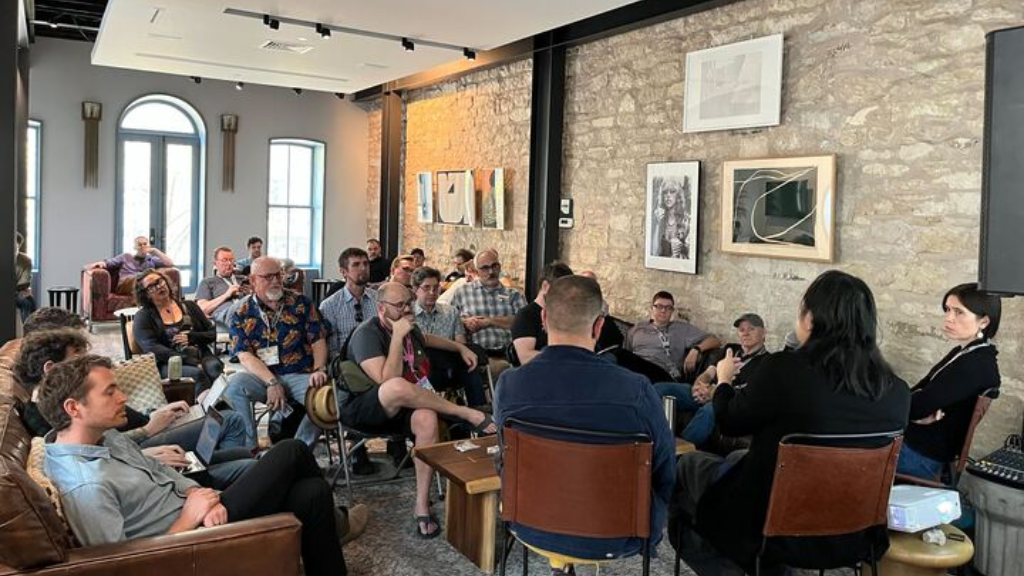
As CC gets closer to launching a protocol based on prosocial preference signals—a simple pact between those stewarding the data and those reusing it for generative AI training—we had the opportunity during SXSW to chat with some great thought leaders about this very topic. Our panelists were Aubra Anthony, Senior Fellow, Technology and International Affairs Program at Carnegie Endowment for International Peace; Zachary J. McDowell, Phd, Assistant Professor, Department of Communication, University of Illinois at Chicago; Lane Becker, President, Wikimedia LLC at Wikimedia Foundation, and our very own Anna Tumadóttir, CEO, Creative Commons to explore sharing in the age of AI. A few key takeaways from this conversation included:
- Balancing Norms and Legal Frameworks: There is a growing interest in developing normative approaches and civil structures that go beyond traditional legal frameworks to ensure equitable use and transparency.
- Navigating AI Traffic and Commercial Use: Wikimedia is adapting to the influx of AI-driven bot traffic and exploring how to differentiate between commercial and non-commercial use. The idea of treating commercial traffic differently and finding ways to fundraise off bot traffic is becoming more prominent, raising important questions about sustainability in an open knowledge ecosystem. From CC’s perspective, we’ve found that as our open infrastructures mature they become increasingly taken for granted, a notion that is not conducive to a sustainable open ecosystem.
- Openness in the Age of AI: There is growing reticence around openness, with creators becoming more cautious about sharing content due to the rise of generative AI (note, this is exactly what our preference signals framework is meant to address, so stay tuned!). We should emphasize the need for open initiatives to adapt to the broader social and economic context, balancing openness with creators’ concerns about protection and sustainability.
- Making Participation Easy and Understandable: To encourage widespread participation in open knowledge systems and for preference signal adoption, tools will need to be simple and intuitive. Whether through collective benefit models or platform cooperativism, ease of use and clarity are essential to engaging the broader public in contributing to open initiatives.
Did you know that many social justice and public good organizations are unable to participate in influential and culture-making events like SXSW due to a lack of funding? CC is a nonprofit organization and all of our activities must be cost-recovery. We’d like to sincerely thank our event sponsor, the John S. and James L. Knight Foundation for making this event and these conversations possible. If you would like to contribute to our work, consider joining the Open Infrastructure Circle which will help to fund a framework that makes reciprocity actionable when shared knowledge is used to train generative AI.
The post CC @ SXSW: Protecting the Commons in the Age of AI appeared first on Creative Commons.
]]>The post Reciprocity in the Age of AI appeared first on Creative Commons.
]]>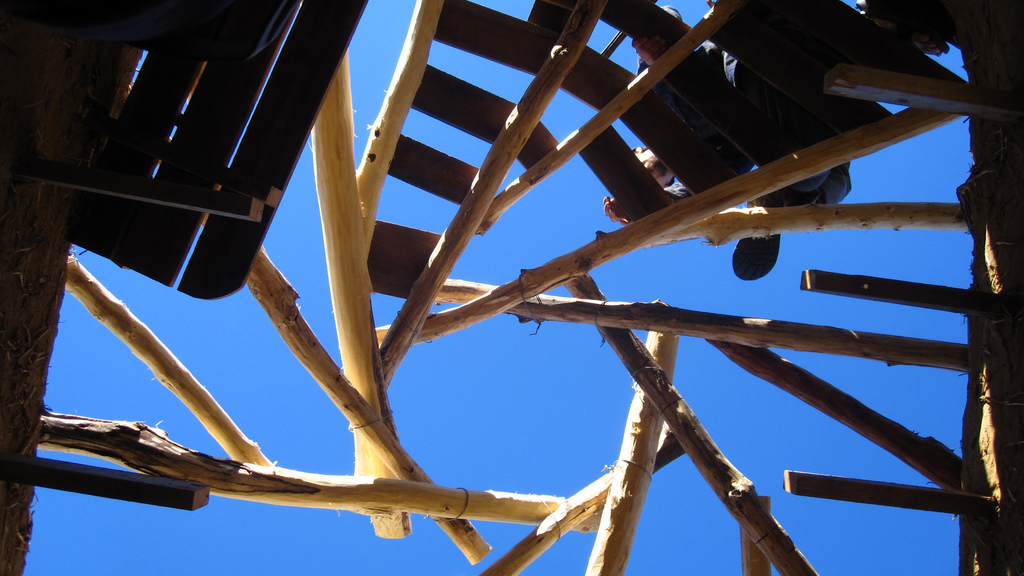
A lot has changed in the past few years, and it is high time for Creative Commons (CC) to be louder about our values. Underpinning our recently released strategic plan is a renewed call for reciprocity. Neutrality serves only the status quo and there is nothing neutral about fighting for a more equitable world through open practices and sharing knowledge.
Since the inception of CC, there have been two sides to the licenses. There’s the legal side, which describes in explicit and legally sound terms, what rights are granted for a particular item. But, equally there’s the social side, which is communicated when someone applies the CC icons. The icon acts as identification, a badge, a symbol that we are in this together, and that’s why we are sharing. Whether it’s scientific research, educational materials, or poetry, when it’s marked with a CC license it’s also accompanied by a social agreement which is anchored in reciprocity. This is for all of us.
But, with the mainstream emergence of generative AI, that social agreement has come into question and come under threat, with knock-on consequences for the greater commons. Current approaches to building commercial foundation models lack reciprocity. No one shares photos of ptarmigans to get rich, no one contributes to articles about Huldufólk seeking fame. It is about sharing knowledge. But when that shared knowledge is opaquely ingested, credit is not given, and the crawlers ramp up server activity (and fees) to the degree where the human experience is degraded, folks are demotivated to continue contributing.
The open movement has always fought for shared knowledge to be accessible for everyone and anyone to use, to learn from. We don’t want to slow down scientific discovery. If we can more rapidly learn, discover, and innovate, with the use of new technologies, that’s wonderful. As long as we’re actually in this together.
What we ultimately want, and what we believe we need, is a commons that is strong, resilient, growing, useful (to machines and to humans)—all the good things, frankly. But as our open infrastructures mature they become increasingly taken for granted, and the feeling that “this is for all of us” is replaced with “everyone is entitled to this”. While this sounds the same, it really isn’t. Because with entitlement comes misuse, the social contract breaks, reciprocation evaporates, and ultimately the magic weakens.
Reciprocity in the age of AI means fostering a mutually beneficial relationship between creators/data stewards and AI model builders. For AI model builders who disproportionately benefit from the commons, reciprocity is a way of giving back to the commons that is community and context specific.
(And in case it wasn’t already clear, this piece isn’t about policy or laws, but about centering people).
This is where our values need to enter the equation: we cannot sit neutrally by and allow “this is for everyone” to mean that grossly disproportionate benefits of the commons accrue to the few. That our shared knowledge pools get siphoned off and kept from us.
We believe reciprocity must be embedded in the AI ecosystem in order to uphold the social contract behind sharing. If you benefit from the commons, and (critically) if you are in a position to give back to the commons, you should. Because the commons are for everyone, which means we all need to uphold the value of the commons by contributing in whatever way is appropriate.
There never has been, nor should there be, a mandatory 1:1 exchange between each individual and the commons. What’s appropriate then, as a way to give back? So many possibilities come to mind, including:
- Increasing agency as a means to achieve reciprocity by allowing data holders to signal their preferences for AI training
- Credit, in the form of attribution, when possible
- Open infrastructure support
- Cooperative dataset development
- Putting model weights or other components into the commons
When we talk about defending the commons, it involves sustaining them, growing them, and making sure that the social contract remains intact for future generations of humans. And for that to happen, it’s time for some reciprocity.
Part of CC being louder about our values is also taking action in the form of a social protocol that is built on preference signals, a simple pact between those stewarding data and those reusing it for generative AI. Like CC licenses, they are aimed at well-meaning actors and designed to establish new social norms around sharing and access based on reciprocity. We’re actively working alongside values-aligned partners to pilot a framework that makes reciprocity actionable when shared knowledge is used to train generative AI. Consider joining the Open Infrastructure Circle to help us move this work forward.
The post Reciprocity in the Age of AI appeared first on Creative Commons.
]]>The post Why Digital Public Goods, including AI, Should Depend on Open Data appeared first on Creative Commons.
]]>
Open Data and Digital Public Goods (DPGs)
CC is a member of the Digital Public Goods Alliance (DPGA) and CC’s legal tools have been recognized as digital public goods (DPGs). DPGs are “open-source software, open standards, open data, open AI systems, and open content collections that adhere to privacy and other applicable best practices, do no harm, and are of high relevance for attainment of the United Nations 2030 Sustainable Development Goals (SDGs).” If we want to solve the world’s greatest challenges, governments and other funders will need to invest in, develop, openly license, share, and use DPGs.
Open data is important to DPGs because data is a key driver of economic vitality with demonstrated potential to serve the public good. In the public sector, data informs policy making and public services delivery by helping to channel scarce resources to those most in need; providing the means to hold governments accountable and foster social innovation. In short, data has the potential to improve people’s lives. When data is closed or otherwise unavailable, the public does not accrue these benefits.
CC was recently part of a DPGA sub-committee working to preserve the integrity of open data as part of the DPG Standard. This important update to the DPG Standard was introduced to ensure only open datasets and content collections with open licenses are eligible for recognition as DPGs. This new requirement means open data sets and content collections must meet the following criteria to be recognised as a digital public good.
- Comprehensive Open Licensing:
- The entire data set/content collection must be under an acceptable open licence. Mixed-licensed collections will no longer be accepted.
- Accessible and Discoverable:
- All data sets and content collection DPGs must be openly licensed and easily accessible from a distinct, single location, such as a unique URL.
- Permitted Access Restrictions:
- Certain access restrictions – such as logins, registrations, API keys, and throttling – are permitted as long as they do not discriminate against users or restrict usage based on geography or any other factors.
The DPGA writes: “This new requirement is designed to increase trust and confidence in all DPGs by ensuring that users can fully engage with solutions without concerns over intellectual property infringement. Simplifying access and usage aligns with the DPGA’s goal of making DPGs truly open and accessible for widespread adoption… it helps foster an environment and ecosystem where innovation can thrive without legal uncertainties.”
AI and Open Data
As CC examines AI and its potential to be a public good that helps solve global challenges, we believe open data will play a similarly important role.
CC recognizes AI is a rapidly developing space, and we appreciate everyone’s diligent work to create definitions, recommendations, and guidance for and warnings about AI. After two years of community consultation, the Open Source Initiative released version 1.0 of the Open Source AI Definition (OSAID) on October 28, 2024. This definition is an important step in starting the conversation about what open means for AI systems. However, the OSAID’s data sharing requirements remain contentious, particularly around whether and how training data for AI models should be shared.
CC is of the opinion that just because it is difficult to build and release open datasets, that does not mean we should not encourage it. In cases where training data should not or cannot be shared, we encourage detailed summaries that explain the contents of the dataset and give instructions for reproducibility, but nonetheless that data should be defined as closed. When data can be made open and shared, it should be.
We agree with Liv Marte Nordhaug, CEO, Digital Public Goods Alliance who said in a recent post: “With regards to AI systems, there is a need to ensure that we don’t inadvertently undermine the open data movement and open data as a category of DPGs by advancing an approach to AI systems that is more permissive than for other categories of DPGs. Maintaining a high bar on training data could potentially result in fewer AI systems meeting the DPG Standard criteria. However, SDG relevance, platform independence, and do-no-harm by design are features that set DPGs apart from other open source solutions—and for those reasons, the inclusion of [AI] training data is needed.”
Next Steps
CC will continue to work with the DPGA, and other partners, as it develops a standard as to what qualifies an AI model to be a digital public good. In that arena we will advocate for open datasets, and consideration of a tiered approach, so that components of an AI model can be considered digital public goods, without the entire model needing to have every component openly shared. Updated recommendations and guidelines that recognize the value of fully open AI systems that use and share open datasets will be an important part of ensuring AI serves the public good.
¹Digital Public Goods Standard
²Data for Better Lives. World Bank (2021). CC BY 3.0 IGO
The post Why Digital Public Goods, including AI, Should Depend on Open Data appeared first on Creative Commons.
]]>The post Six Insights on Preference Signals for AI Training appeared first on Creative Commons.
]]>
At the intersection of rapid advancements in generative AI and our ongoing strategy refresh, we’ve been deeply engaged in researching, analyzing, and fostering conversations about AI and value alignment. Our goal is to ensure that our legal and technical infrastructure remains robust and suitable in this rapidly evolving landscape.
In these uncertain times, one thing is clear: there is an urgent need to develop new, nuanced approaches to digital sharing. This is Creative Commons’ speciality and we’re ready to take on this challenge by exploring a possible intervention in the AI space: preference signals.
Understanding Preference Signals
We’ve previously discussed preference signals, but let’s revisit this concept. Preference signals would empower creators to indicate the terms by which their work can or cannot be used for AI training. Preference signals would represent a range of creator preferences, all rooted in the shared values that inspired the Creative Commons (CC) licenses. At the moment, preference signals are not meant to be legally enforceable. Instead, they aim to define a new vocabulary and establish new norms for sharing and reuse in the world of generative AI.
For instance, a preference signal might be “Don’t train,” “Train, but disclose that you trained on my content,” or even “Train, only if using renewable energy sources.”
Why Do We Need New Tools for Expressing Creator Preferences?
Empowering creators to be able to signal how they wish their content to be used to train generative AI models is crucial for several reasons:
- The use of openly available content within generative AI models may not necessarily be consistent with creators’ intention in openly sharing, especially when that sharing took place before the public launch and proliferation of generative AI.
- With generative AI, unanticipated uses of creator content are happening at scale, by a handful of powerful commercial players concentrated in a very small part of the world.
- Copyright is likely not the right framework for defining the rules of this newly formed ecosystem. As the CC licenses exist within the framework of copyright, they are also not the correct tools to prevent or limit uses of content to train generative AI. We also believe that a binary opt-in or opt-out system of contributing content to AI models is not nuanced enough to represent the spectrum of choice a creator may wish to exercise.
We’re in the research phase of exploring what a system of preference signals could look like and over the next several months, we’ll be hosting more roundtables and workshops to discuss and get feedback from a range of stakeholders. In June, we took a big step forward by organizing our most focused and dedicated conversation about preference signals in New York City, hosted by the Engelberg Center at NYU.
Six Highlights from Our NYC Workshop on Preference Signals
- Creative Commons as a Movement
Creative Commons is a global movement, making us uniquely positioned to tackle what sharing means in the context of generative AI. We understand the importance of stewarding the commons and the balance between human creation and public sharing.
- Defining a New Social Contract
Designing tools for sharing in an AI-driven era involves collectively defining a new social contract for the digital commons. This process is essential for maintaining a healthy and collaborative community. Just as the CC licenses gave options for creators beyond no rights reserved and all rights reserved, preference signals have the potential to define a spectrum of sharing preferences in the context of AI that goes beyond the binary options of opt-in or opt-out.
- Communicating Values and Consent
Should preference signals communicate individual values and principles such as equity and fairness? Adding content to the commons with a CC license is an act of communicating values; should preference signals do the same? Workshop participants emphasized the need for mechanisms that support informed consent by both the creator and user.
- Supporting Creators and Strengthening the Commons
The most obvious and prevalent use case for preference signals is to limit use of content within generative AI models to protect artists and creators. There is also the paradox that users may want to benefit from more relaxed creator preferences than they are willing to grant to other users when it comes to their content. We believe that preference signals that meet the sector-specific needs of creators and users, as well as social and community-driven norms that continue to strengthen the commons, are not mutually exclusive.
- Tagging AI-Generated vs. Human-Created Content
While tags for AI-generated content are becoming common, what about tags for human-created content? The general goal of preference signals should be to foster the commons and encourage more human creativity and sharing. For many, discussions about AI are inherently discussions about labor issues and a risk of exploitation. At this time, the law has no concept of “lovingly human”, since humanness has been taken for granted until now. Is “lovingly human” the new “non-commercial”? Generative AI models also force us to consider what it means to be a creator, especially as most digital creative tools will soon be driven by AI. Is there a specific set of activities that need to be protected in the process of creating and sharing? How do we address human and generative AI collaboration inputs and outputs?
- Prioritizing AI for the Public Good
We must ensure that AI benefits everyone. Increased public investment and participatory governance of AI are vital. Large commercial entities should provide a public benefit in exchange for using creator content for training purposes. We cannot rely on commercial players to set forth industry norms that influence the future of the open commons.
Next Steps
Moving forward, our success will depend on expanded and representative community consultations. Over the coming months, we will:
- Continue to convene our community members globally to gather input in this rapidly developing area;
- Continue to consult with legal and technical experts to consider feasible approaches;
- Actively engage with the interconnected initiatives of other civil society organizations whose priorities are aligned with ours;
- Define the use cases for which a preference signals framework would be most effective;
- Prototype openly and transparently, seeking feedback and input along the way to shape what the framework could look like;
- Build and strengthen the partnerships best suited to help us carry this work forward.
These high-level steps are just the beginning. Our hope is to be piloting a framework within the next year. Watch this space as we explore and share more details and plans. We’re grateful to Morrison Foerster for providing support for the workshop in New York.
Join us by supporting this ongoing work
You have the power to make a difference in a way that suits you best. By donating to CC, you are not only helping us continue our vital work, but you also benefit from tax-deductible contributions. Making your gift is simple – just click here. Thank you for your support.
The post Six Insights on Preference Signals for AI Training appeared first on Creative Commons.
]]>The post CC Certificate Alumni Making a Global Impact appeared first on Creative Commons.
]]>In this interview, we were delighted to speak with Hanae Lrhoul, a graduate of the CC Certificate for Educators.
Hanae works as a professor at the Information Sciences school in Rabat, Morocco. Her main research topics are related to open access, scientometrics, and data visualization. She is also an associate editor of the Directory of Open Access Journals (DOAJ), the CC Morocco chapter lead, and Vice President of the International Association of Francophone Libraries (AIFBD).
Q: What inspired you to take the CC Certificate for Educators?
Q: You’re a professor in the school of information science. How has what you learned in the CC Certificate course informed your work?
Q: I understand that you’re an integral part of the CC Morocco team and helped establish that chapter back in 2020/2021. Can you tell us more about the state of open access and CC licenses in Morocco?
Q: I also know you’ve done some interesting work with the government – for example, you recently told me that the Ministry of Higher Education launched the first open science project as part of the Minister’s ESRI pact.
Q: What advice do you have for folks who are new to open science or open education initiatives and are looking to get more involved?
Q: Final words?
CC Certificate Alumni Interview with Hanae Lrhoul by Shanna Hollich is licensed via CC BY 4.0.
Registering for the CC Certificate program is one way to start taking Hanae’s wonderful advice to “adopt and embrace open access.” To learn more about our upcoming courses, please visit the CC Certificate website. Or, read about how our alumni have used the Certificate course knowledge in a number of ways, including: developing a microcredential course about open educational resources, an Open Syllabus project, supporting the UNESCO Recommendation on Open Science; an open access policy for a cultural heritage institution working with digitized art works; open licensed content for a bachelor of business program in Bangladesh and Masters courses in the US. You can also read alumni testimonials here.
If you are a CC Certificate alum and would like to share your amazing work with our CC community, please reach out to us at certificates AT creativecommons DOT org.
The post CC Certificate Alumni Making a Global Impact appeared first on Creative Commons.
]]>The post Questions for Consideration on AI & the Commons appeared first on Creative Commons.
]]>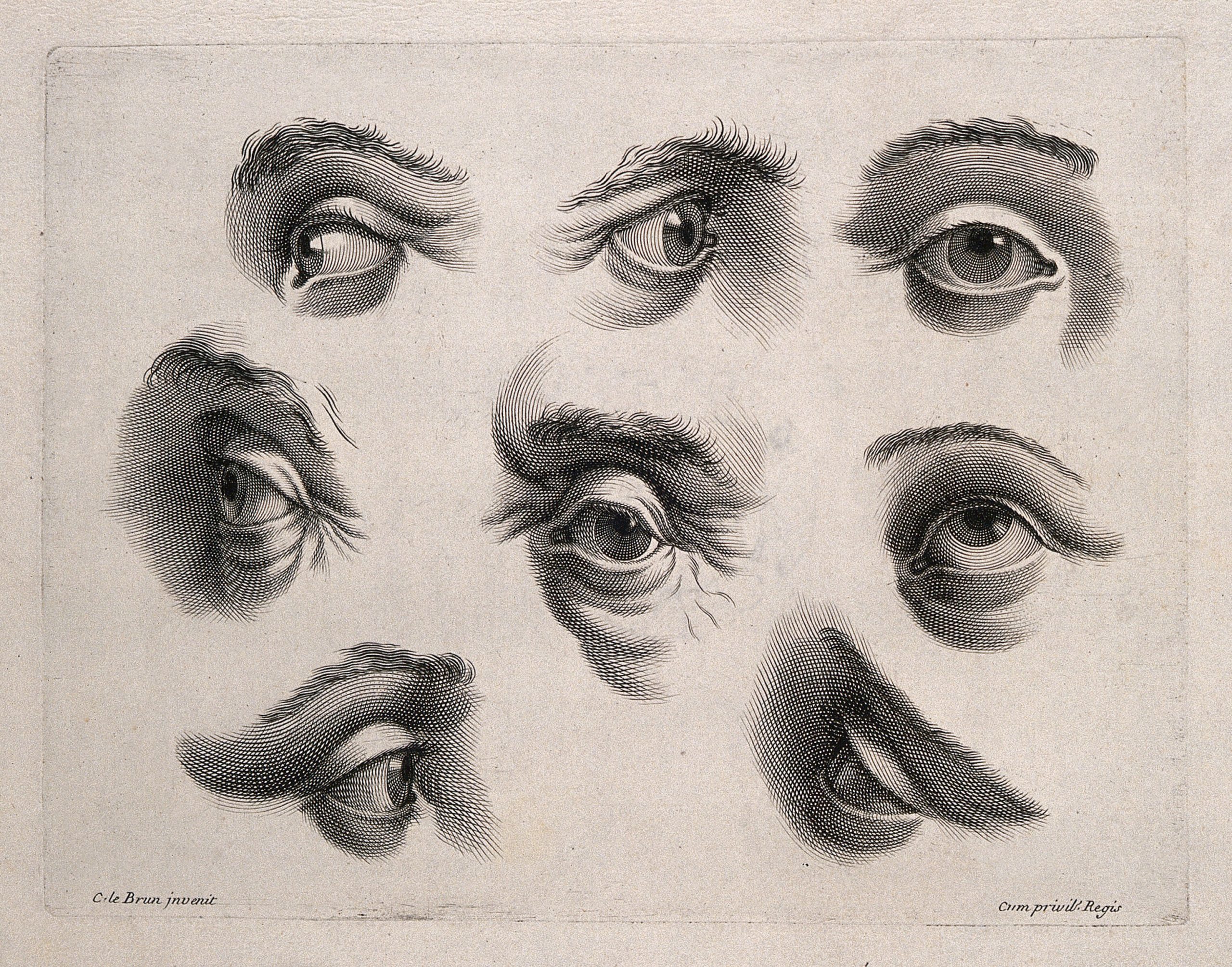
The intersection of AI, copyright, creativity, and the commons has been a focal point of conversations within our community for the past couple of years. We’ve hosted intimate roundtables, organized workshops at conferences, and run public events, digging into the challenging topics of credit, consent, compensation, transparency, and beyond. All the while, we’ve been asking ourselves: what can we do to foster a vibrant and healthy commons in the face of rapid technological development? And how can we ensure that creators and knowledge-producing communities still have agency?
History and Evolution
When Creative Commons was founded over 20 years ago, sharing on the internet was broken. With the introduction of the CC licenses, the commons flourished. Licenses that enabled open sharing were perfectly aligned with the ideals of giving creators a choice over how their works were used.
Those who embrace openly sharing their work have a myriad of motivations for doing so. Most could not have anticipated how their works might one day be used by machines: to solve complex medical questions, to create other-wordly pictures of dogs, to train facial recognition systems – the list goes on.
Can we continue to foster a vibrant and healthy commons in today’s technological environment? How can we think innovatively about creator choice in this context?
Preference Signals
Preference signals for AI are the idea that an agent (creator, rightsholder, entity of some kind) is able to signal their preference with regards to how their work is used to train AI models. Last year, we started thinking more about this concept, as did many in the responsible tech ecosystem. But to date the dialog is still fairly binary, offering only all-or-nothing choices, with no imagination for how creators or communities might want their work to be used.
Enabling Commons-Based Participation in Generative AI
What was once a world of creators making art and researchers furthering knowledge, has the risk of being reduced to a world of rightsholders owning, controlling, and commercializing data. In this bleak future, it’s no longer a photo album, a poetry book, or a family blog. It’s content, it’s data, and eventually, it’s tokens.
We recognize that there is a perceived tension between openness and creator choice. Namely, if we give creators choice over how to manage their works in the face of generative AI, we may run the risk of shrinking the commons. To potentially overcome, or at least better understand the effect of generative AI on the commons, we believe that finding a way for creators to indicate “no, unless…” would be positive for the commons. Our consultations over the course of the last two years have confirmed that:
- Folks want more choice over how their work is used.
- If they have no choice, they might not share their work at all (under a CC license or strict copyright).
If these views are as wide ranging as we perceive, we feel it is imperative that we explore an intervention, and bring far more nuance into how this ecosystem works.
Generative AI is here to stay, and we’d like to do what we can to ensure it benefits the public interest. We are well-positioned with the experience, expertise, and tools to investigate the potential of preference signals.
Our starting point is to identify what types of preference signals might be useful. How do these vary or overlap in the cultural heritage, journalism, research, and education sectors? How do needs vary by region? We’ll also explore exactly how we might structure a preference signal framework so it’s useful and respected, asking, too: does it have to be legally enforceable, or is the power of social norms enough?
Research matters. It takes time, effort, and most importantly, people. We’ll need help as we do this. We’re seeking support from funders to move this work forward. We also look forward to continuing to engage our community in this process. More to come soon.
The post Questions for Consideration on AI & the Commons appeared first on Creative Commons.
]]>The post CC at WIPO: Slow progress on copyright exceptions for cultural heritage institutions appeared first on Creative Commons.
]]>
Last week, Creative Commons (CC) participated in the 45th session of the World Intellectual Property Organization (WIPO) Standing Committee on Copyright and Related Rights (SCCR). In this post, we briefly report on the session discussions on exceptions and limitations for cultural heritage institutions (CHIs), a topic of utmost relevance to our Open Culture Program.
As in previous SCCR sessions, our main objective was to drive copyright reform towards better sharing of heritage materials in the interest of the public and in tune with the sharing possibilities of the digital environment. For more details check out our official statement and watch our intervention on the WIPO webcast.
Overall, we welcome the session outcomes. However, protracted discussions on the various versions of the implementation plan for the Work Program on Limitations and Exceptions (SCCR/45/6 and SCCR/43/8 REV.), which aim to determine a clear path forward in the negotiations, meant that substantive discussions could not take place. We look forward to engaging with the future Draft Implementation Plan on the Work Program on Limitations and Exceptions (SCCR/45/10 PROV.) and to bringing our expertise on copyright in the public interest to the discussions on objectives, principles, and options.
Limitations and exceptions for CHIs were not the only issue on the Committee’s agenda. Other key items included the protection of broadcasting organizations (read Communia’s take on this topic), other exceptions and limitations such as for educational and research institutions and for people with disabilities, copyright issues in the digital environment, as well as the interplay between generative artificial Intelligence (AI) and copyright, among others.
You can read more about the meeting outcomes in the Summary by the Chair.
We look forward to participating in the Committee’s next session to contribute to creating a fairer and more balanced international copyright system in the public interest.
The post CC at WIPO: Slow progress on copyright exceptions for cultural heritage institutions appeared first on Creative Commons.
]]>